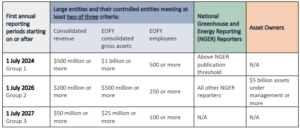
Treasury has released Exposure Draft legislation which, if passed, will amend parts of the Australian Securities and Investment Commission Act 2001 and the Corporations Act 2001 (Cth) to introduce mandatory requirements for large businesses and financial institutions to disclose their climate-related risks and opportunities. Background.
The Bill requires entities that lodge financial reports under Chapter 2M of the Corporations Act, meet certain minimum size thresholds, and/or have emissions reporting obligations under the NGER scheme, to make disclosures relating to climate under sustainability standards made by the AASB.
Chapter 2M provides for record-keeping, financial reports and audit. Part 2M.3 covers financial reporting including who must prepare annual financial reports and the contents of those annual financial reports.
The amendments phase in the new mandatory disclosure obligations over a period of four years, potentially starting on 1 July 2024, as shown in the below table.
The amendments include a new ‘sustainability report’ for a financial year which entities will need to prepare in addition to financial statements, notes to financial statements and a director declaration which form part of an annual financial report.
The sustainability report for a financial year consists of:
• the climate statement for the year;
• notes to the climate statement;
• any statements prescribed by the regulations for the year; and
• the directors’ declaration about the compliance of the statements with the relevant sustainability standards.
Climate change is recognised internationally as presenting material risks to the global financial system – risks which need to be managed by capital markets, regulators and corporations. These include physical risks of climate change and the transition risks associated with the market, regulatory and technological changes brought on by efforts to mitigate climate change.
If you found this article helpful, then subscribe to our news emails to keep up to date and look at our video courses for in-depth training. Use the search box at the top right of this page or the categories list on the right hand side of this page to check for other articles on the same or related matters.

Author: David Jacobson
Principal, Bright Corporate Law
Email: djacobson@brightlaw.com.au
About David Jacobson
The information contained in this article is not legal advice. It is not to be relied upon as a full statement of the law. You should seek professional advice for your specific needs and circumstances before acting or relying on any of the content.


